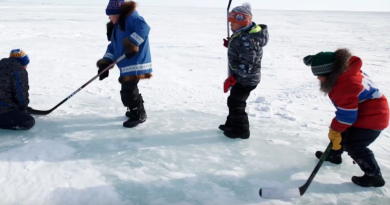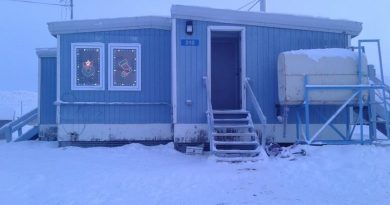Navy commander defends Alaska military exercise against critics

The U.S. Navy will soon be participating again in Northern Edge, the massive training exercise that brings together different branches of the military every two years for war games in the Gulf of Alaska.
Among the critics of Northern Edge are commercial fishing groups, environmentalists and coastal communities who say the timing and location of the exercise, which includes live ammunition, is detrimental to salmon and whales migrating north in the early summer.
Rear Admiral Mark Sucato, commander of the Navy’s northwest region, was in Alaska recently listening to those concerns and doing outreach ahead of Northern Edge this summer.
The following transcript has been lightly edited for clarity.
Rear Adm. Mark Sucato: Our mantra is that you want to train as close to his how you would fight as possible, because the more artificialities, the less realistic it is, potentially, the less effective it is. And opportunities to come up to Alaska and do Northern Edge really allow the United States’ military forces to practice advanced concepts, test the effectiveness of certain technologies, and do it in a, both large enough, and as well at scale, speed, fast enough manner, to really see how it would work in real life.
Casey Grove: So before you came here, you were in Kodiak and interfacing with folks there. How have those conversations gone?
MS: So all of our engagements, over the last two weeks, have gone extremely positively. It would probably be improper for me to try to speak for the other stakeholders who we’re meeting with, but from our vantage point, they were very positive, they were very, very collaborative, and left us wanting to do more of it.
CG: I mean, that said, there have to be some criticisms that you’ve heard, right? I mean, I know fishermen and environmentalists are concerned about those kinds of live-fire training drills that are happening out there. What do you say to those folks about that? I mean, they’re worried that explosions are going to hurt the whales or that they’re gonna scare fish away and things like that. I mean, what do you say to those folks?
MS: So, I mean, we certainly wouldn’t want to dissuade them from their opinions. One of the main reasons we came up here is to really listen to their concerns. From our vantage point, these exercises, particularly in the Gulf of Alaska, do not affect the fish. And there’s considerable science, considerable work, that the Navy has done, as well as with our partners, to really precisely in a scientific way demonstrate that these exercises don’t affect them.
CG: And I have to push back on that a little bit, because that’s not what you hear from the critics, right? So how is that possible that it doesn’t affect the fish and the whales?
MS: So in the case of fish, the exercise area for this exercise was modified in response to feedback from the stakeholders, to include fishermen, to deconflict any Navy operations from the location of either the fisherman or the fisheries. This year’s exercise involves a new intercontinental shelf mitigation to bring the training further off the continental shelf out to a depth of 4,000 meters, which, when you look at where the fish live, where the fishermen fish, that is well deconflicted in space.
CG: And it sounds like those are changes that were made to address those concerns?
MS: That is correct. So this exercise is supported by an environmental impact statement. The Navy just completed the third environmental impact statement regarding this. And those additional mitigations were new to this EIS that was published in 2023.
CG: I wanted to ask you about, you know, things that we’ve heard about either the Coast Guard or the Navy expanding operations in the sub-Arctic or the Arctic as there’s less and less sea ice. And I just wonder if there’s anything you could tell me about that, any plans going forward that people might, you know, see coming up on in the future?
MS: Sure. One of the Navy’s primary missions is to support our country’s access to the global commons, to our sea lines of communication, to support and provide the security underpinning for trade. As the Arctic becomes more available to shipping, becomes a sea line of communication, the Navy will maintain an increasingly focused effort on it, because that is a global common that our country will want access to. Unimpeded access. And their Navy will be ready to work on it.
CG: And when you think about that and talk about that, does that also include concerns about Russia and China in the region?
MS: Our security position, our strategy, particularly for the Arctic, as it becomes more and more accessible, will be really based on any potential competitor. While our series of documents, for example, the National Defense Strategy, will discuss specific countries, our focus when it comes to protecting access to the commons is less aimed at a particular country and more aimed at allowing our trade, our interests, our scientific inquiry to have access to all of the oceans.
CG: With Russia or China, though, I mean, those countries and their activities have come up in conversations that you’ve had right? I mean, I understand the point that you have to be prepared for anything, but it has to be true that folks like yourself are talking about Russia and China, right?
MS: We are. The current geopolitical environment is considerably more dynamic, in some areas potentially more dangerous, than anything we’ve seen in several decades. Both China and Russia are certainly competitors and potential future adversaries for our country. And to be prudent, we pay close attention to them. They are two countries whose activities we are interested in, not because we want to be overly intrusive, but because, in the event that the Navy will be called to enforce our country’s interests, that we’re prepared to do that.
Related stories from around the North:
Canada: U.S. report claims Trudeau told NATO Canada will never meet military spending target, CBC News
Denmark: Arctic security key in upcoming defence agreement: acting Danish defence minister, Eye on the Arctic
Finland: Russian cyber attacks, espionage pose growing threat to Finnish national security, Yle news
Greenland: Growing focus on Arctic puts Greenland at higher risk of cyber attacks: assessment, Eye on the Arctic
Iceland: NATO anti-submarine warfare exercise underway in North Atlantic, Eye on the Arctic
Norway: Norway expels 15 intelligence officers at Russian Embassy, The Independent Barents Observer
Russia: Russian Arctic rescue exercise attended by observers from Iran and Saudi Arabia, The Independent Barents Observer
Sweden: Russian spy ships surveying Nordic energy infrastructure, Radio Sweden
United States: U.S. nominates Alaskan as first Arctic ambassador, Eye on the Arctic



